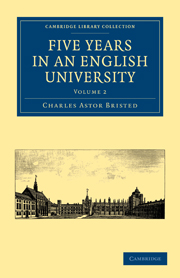Book contents
- Frontmatter
- Contents
- The Cambridge System of Education in its Intellectual Results
- Physical and Social Habits of Cambridge Men.—Their Amusements, &c
- On the State of Morals and Religion in Cambridge
- The Puseyite Disputes in Cambridge, and the Cambridge Camden Society
- Inferiority of our Colleges and Universities in Scholarships
- Supposed counterbalancing Advantages of American Colleges
- The Advantages of Classical Studies, particularly in reference to the Youth of our Country
- What can we, and what ought we, to do for our Colleges
- APPENDIX: Containing Six Exercises for Trinity Declamations, and Three for the Members' Prize
- ERRATA
The Advantages of Classical Studies, particularly in reference to the Youth of our Country
Published online by Cambridge University Press: 28 April 2011
- Frontmatter
- Contents
- The Cambridge System of Education in its Intellectual Results
- Physical and Social Habits of Cambridge Men.—Their Amusements, &c
- On the State of Morals and Religion in Cambridge
- The Puseyite Disputes in Cambridge, and the Cambridge Camden Society
- Inferiority of our Colleges and Universities in Scholarships
- Supposed counterbalancing Advantages of American Colleges
- The Advantages of Classical Studies, particularly in reference to the Youth of our Country
- What can we, and what ought we, to do for our Colleges
- APPENDIX: Containing Six Exercises for Trinity Declamations, and Three for the Members' Prize
- ERRATA
Summary
“Haec studia adolescentiam alunt, senectutem oblectant, secundas res ornant, adversis perfugium et solatium praebent, delectant domi non impediunt foris.”
—Cic. pro Archia.“The cultivated world, up to the present day, has been bound together, and each generation bound to the preceding by living upon a common intellectual estate. They have shared in a common development of thought because they have understood each other. Their standard examples of poetry, eloquence, history, criticism, grammar, etymology, have been a universal bond of sympathy, however diverse might be the opinions which prevailed respecting any of these examples. All the civilized world has been one intellectual nation, and it is this which has made it so great and prosperous a nation.”
—Whewell on University Education.We have thus far proceeded on the supposition that classical studies form a necessary and important part of a liberal education. But there is a class of persons (not very numerous or influential perhaps, but still too much so to be passed over in silence) who would join issue with me on this first principle. They would deny the utility of classics as a general collegiate study, and affirm that the error of our Colleges is, not the classical deficiency of their course, but their admission of Latin and Greek at all as a necessary element of that course.
- Type
- Chapter
- Information
- Five Years in an English University , pp. 117 - 149Publisher: Cambridge University PressPrint publication year: 2010First published in: 1852



